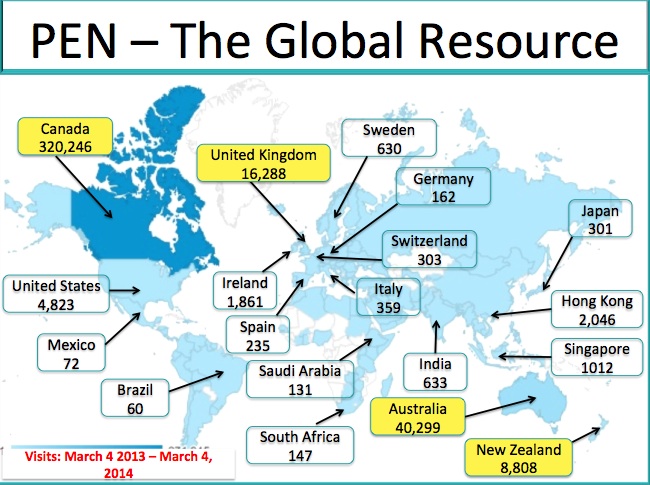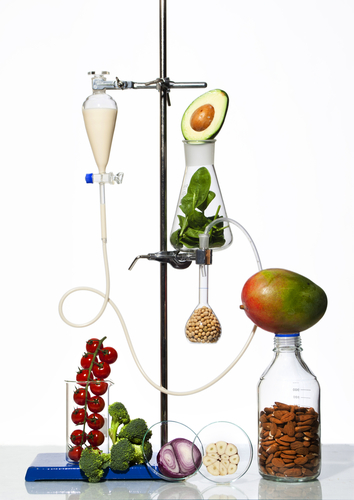PEN eNews 3(6) April 2014
PEN
® eNews is a monthly e-newsletter shared with the global PEN Community and created to help dietitians position themselves as leaders in evidence-based nutrition practice. In addition, users of the PEN System will find articles on the new evidence, resources and features available and how to maximize one's use of PEN.

eating bugs for breakfast in 2014
Will you eat bugs for breakfast in 2014? I have seen articles in popular media forecasting the potential demand for “Westernized” countries to embrace insects as part of their dietary repertoire of proteins (which is already the case in many parts of the world). As a dietitian, did you anticipate that this would be something about which you would be thinking and providing guidance?
And yet, in parts of Africa, Asia and Latin America, the consumption of insects (raw, cooked or processed) is commonly practiced – a normal and important part of the diet (1). As I think more about things that crawl, I remember that I do enjoy eating lobster and crab – dipped in a side of lemon garlic butter. In fact, where I am from [land-locked, cattle country Calgary, Alberta Canada], this particular meal is considered a delicacy. Often it is your unique perspective and experience that influences whether a particular food makes you squeamish.
The potential benefits of eating insects, or foods that are unfamiliar and less traditional to your native culture has got me thinking about research studies, and the people who sign up to be study participants in the name of propelling science forward. Would you participate in studies of entomophagy (eating insects)?
The thought of eating something quite unfamiliar also had me thinking about other popular counseling techniques that many of us use in practice. What would it take for you to embrace the idea of incorporating something very unfamiliar as part of your repertoire of dietary protein? Would it help you engage in an exercise of reflecting on the pros and cons of eating the unfamiliar food? Would it help to review the nutritional information of this unfamiliar food available for consumption? For me, I doubt more information about the benefits of the unfamiliar food would inspire me to eat it.
As I reflect on these questions, I am reminded of two things:
 That when reading research, we need to consider how applicable the research is to the populations we each work with. Is there something special about the population studied that makes them similar or dissimilar from the population you work with? I like to think that I am a person open to new ideas and concepts. But the idea of expanding my protein repertoire to include anything that crawls on the ground or flies – something mostly unfamiliar to me - would likely make me pass on this study opportunity.
That when reading research, we need to consider how applicable the research is to the populations we each work with. Is there something special about the population studied that makes them similar or dissimilar from the population you work with? I like to think that I am a person open to new ideas and concepts. But the idea of expanding my protein repertoire to include anything that crawls on the ground or flies – something mostly unfamiliar to me - would likely make me pass on this study opportunity. - When working with our populations, whomever they may be, we need to stop and consider how they are receiving the recommendation we are encouraging them to (and secretly hoping they willingly) embrace. Depending on previous experiences, people may be open to your idea – or – it may be totally foreign to them, akin to anything that flies or crawls, or is totally foreign to them.
In this issue of PEN eNews 3(6), we have articles showcasing how dietitians use evidence to guide their practice. How the BDA uses evidence to support its media relations outlines how BDA uses evidence to remain a thought-leader in the UK and international media. Australia’s Healthy Weight Week 2014: Our biggest and most successful yet! shares how Australian dietitians invited men and women to eat better and feel better. Want to improve your evidence-based practice skills? Our PEN® Evidence Analyst outlines 5 Ways to sharpen your evidence-based practice skills. This and more in PEN eNews 3(6).
Kristyn Hall MSc, RD
Editor, PEN® eNews
Reference:
- Rumpold BA, Schluter OK. Nutritional Composition and Safety Aspects of Edible Insects. Mol Nutr and Food Res. 2013 [cited 2013 Nov 10];57(5):802-823. Abstract available from: http://www.ncbi.nlm.nih.gov/pubmed/23471778
PEN® eNews may contain links to other external websites. PENnutrition.com is not responsible for the privacy practices or the content of such external websites. Dietitians of Canada, Dietitians Association of Australia, Dietitians New Zealand and The British Dietetic Association do not endorse the content, products or services on other websites.
PEN selected for Accreditation Canada’s Leading Practices Database!
We are pleased to share that the PEN® database has been selected for Accreditation Canada’s Leading Practices Database. This development recognizes PEN® as an innovative practice for health care in Canada. Accreditation Canada is an independent, not-for-profit organization fostering quality improvement in health services based on evidence-based standards and external peer review. For more information, go to http://www.accreditation.ca/innovative-practices-coast-coast-coast-now-fully-integrated-leading-practices-database-accreditation
Written by Jayne Thirsk, RD, PhD, FDC
PEN® Director
Dietitians of Canada
What did PEN Accomplish in 2013-2014?
Dietitians are an intense group of people. Each of us advances the dietetic profession by what we do, day-in and day-out. Sometimes, when stuck in the minutia of day-to-day life, we forget to stop to think about what we have accomplished. In this article, we pause to share what the PEN® team did accomplish in 2013-2014 fiscal year:
- We welcomed a new national dietetic association to the international collaboration.
- PEN developed 5 new orientation tutorials, designed to help you maximize your time in PEN®.
- PEN® achieved HON certification.
- PEN® formed the foundation of Quick-Synch Service (QSS).
- We introduced a new feature – My PEN® Favourites.
- We unleashed 60 PEN® Evidence Toolkits!
 We welcomed a new national dietetic association to the international collaboration
We welcomed a new national dietetic association to the international collaboration
In December, the PEN® global partnership welcomed all members of the Irish Nutrition and Dietetics Institute (INDI) who now enjoy full online access to the PEN® system’s evidence-based dietetic practice guidance, client tools, toolkits and more. If you are interested in learning how your national dietetic association can join the PEN international collaboration contact Jayne Thirsk at: jayne.thirsk@dietitians.ca
- The PEN team developed a series of training modules to familiarize dietitians and new PEN authors to the PEN evidence-based processes and critical appraisal techniques.
These modules include search strategies for using PEN® and highlight PEN® features, including the toolkits.
- PEN® achieved HON certification.
December also brought news that the PEN® system website had earned HON certification. HON refers to Health on the Net, which is a non-profit, non-government organization established in 1995 and dedicated to promoting credible health information on the Internet.
To receive HON certification, a website undergoes scrutiny by HON officials and must comply with criteria established by HON. There is ongoing surveillance of the website and a systematic biennial review. We proudly saw The PEN: Practice-based Evidence in Nutrition® system included with other websites such as Cochrane.org, and Mayoclinic.com as a source of trustworthy online health and nutrition information. Click to learn more about the Health on the Net Foundation.
- PEN formed the foundation of the Quick-Synch Service (QSS).
QSS is another way to get fast, easy access to the best evidence for practice. QSS has many great features: - Focused overview of single practice topic from PEN: Practice-based Evidence in Nutrition®
- Designed for the busy health practitioner with an hour or less to spend per week on continuing professional development
- Self-scoring quiz with immediate feedback on knowledge gained
- Certificate of completion for your professional development portfolio
- Supports self-reflection on what you learn and how you will apply it to practice
- For more information, click here.
- We introduced a new feature – My PEN® Favourites.
My PEN® Favourites allows you to save your favourite practice questions, practice guidance summaries, toolkits, evidence summaries, backgrounds and tools & resources so they are all conveniently located in one place. Lisa Koo shows you how to use this new feature . Note: Unfortunately individuals accessing PEN® by a site license are unable to access this feature because they do not logon to the PEN® database with a unique username.
- We unleashed 60 PEN Evidence Toolkits!
Toolkits provide a quick summary of evidence-based practice guidance organized according to steps in a standardized Nutrition Care Process (NCP) as described by the Academy of Nutrition and Dietetics. While exploring a PEN® PET, be sure to explore the Toolkit Table of Contents on the right hand side of the screen. There is succinct practice-guidance contained within each section of the PEN® PET. To Access PETs, Click on the Toolkits icon on the PEN® home page; or on the Knowledge Pathways Table of Contents page, click on the any of the magnifying glasses under the Toolkit/Practice Guidance Summary (PGS) column or for those Knowledge Pathways with a Toolkit you can also access them from the right hand navigation bar on the Knowledge Pathway home page .
As we look forward to 2014-2015, we take inspiration from this quote: “Take pride in how far you have come. Have faith in how far you will go.”
Submitted by Jayne Thirsk RD, PhD, FDC
Director, Practice-based Evidence in Nutrition (PEN)
What's New in PEN®
New Knowledge Pathways
New Practice Questions
Updated Practice Questions
- Do institutionalized, older adults (65 years of age or older) who closely follow a diet prescription have better control of their chronic disease (e.g. diabetes) than those who do not?
- What sources of DHA and EPA are acceptable to vegetarians?
- Are there any food or herbal supplements that may interact with immunosuppressive medications used to treat renal transplant recipients (RTRs)?
- Are there safety concerns for feeding fish to infants and young children related to mercury contamination?
- How beneficial are dietary supplements (e.g. niacin, garlic, policosanol, red yeast rice, red clover, rice bran oil, lecithin, coenzyme Q10, guggul) in the prevention or the treatment of cardiovascular disease?
- What nutrition strategies can prevent cardiovascular disease (CVD) in the healthy population (primary prevention)?
- What dietary components, if any, are triggers for migraine among migraineurs?
- Why is iron-fortified formula recommended for formula-fed term infants? What is the recommended level or iron fortification in formula?
- Is homemade evaporated milk formula a suitable alternative to breastmilk or commercial infant formula for infant feeding?
- Does the use of a continuous glucose monitoring system (CGMS) result in improved glycemic control compared to self-monitoring of blood glucose (SMBG)?
News-making Evidence
Article AnalysisEvidence ClipOther Professional Tools
Client Tools
How do I…reference PEN®?
Written by Lisa Koo, RD PEN® Quality Assistant 
Many health professionals use the information in the PEN® system for presentations and handouts. We are often asked “How do I reference PEN® if I use information from it in a presentation?”
There are several different types of resources available in the PEN® system and therefore different permissions apply when citing/referencing or reproducing these documents.
Referencing documents developed by PEN®
Dietitians of Canada owns the copyright on all knowledge pathway questions, key practice points, evidence statements and summaries, background documents, practice guidance summaries and toolkits. If a user wishes to cite or use part of the information (and not the entire PEN document) for a presentation or resource, there are 7 pieces of information needed to citing PEN appropriately:
 Dietitians of Canada.
Dietitians of Canada. - [Insert name or title of the PEN information used].
- In: Practice-based Evidence in Nutrition [PEN].
- [Insert date the information was Last Updated, shown on the PEN website]
- [Insert date you are citing the information].
- Available from: [Insert link to information cited]
- Access only by subscription or sign up for a free two week trial.
Here is an example of how this looks:
Keep in mind that documents developed by the PEN team (e.g. practice questions, practice guidance summaries, toolkits, evidence summaries, backgrounders and even complete knowledge pathways) can be downloaded for personal, non-commercial use, research or study. For example, licensed subscribers may download, duplicate and distribute copies of the PEN
® branded client handouts for educational use with their own clients. However, institutions must have sufficient numbers of site or group licenses in order to make multiple copies to meet client needs. Have questions about anything to do with citing or licensing? Contact us at
http://www.pennutrition.com/contact.aspx
Reproducing Third Party Tools
The PEN® system also contains tools that are from outside organizations and evaluated as being consistent with the evidence. These documents include client tools, professional tools, research papers, documents, webpages and links that point to external websites from the PEN® system. We have sought permission to include the links within the PEN® database but since we do not own the copyright for these resources, you should contact these associations directly to learn about their copyright policies and permissions if you wish to do anything other than simply share the full resource with a client or colleague. This information is usually found on their website. They will provide a contact email address that will allow you to send them an email requesting permission for the specific resource you would like to use.
If you have any questions about the information in this article, or other questions about PEN, please email me at lisa.koo@dietitians.ca.
How the BDA uses Evidence to Support its Media Relations
PEN and the UK Media
The British Dietetic Association (BDA) is up there with the big hitters in the media when it comes to food, nutrition and hydration commentary in the UK and international media. For example ,
their annual list of diets to avoid in the New Year, issued in November each year, is a much anticipated list and gains international interest and coverage.
Approaches from the media, as you can imagine, can vary greatly in what they want. From the high level political to the low level, quite frankly, crazy stories. One day the BDA press office is talking to the international media about the latest conclusion from Europe on aspartame (safe as it happens) then another, they are talking to the BBC about the Breatharian Diet (which involves giving up food and liquids in favour of getting ones nourishment from sunlight and meditation alone). While no two days are the same, each day has one simple common denominator: Evidence!

We may want to welcome some new research or we may simply want to dismiss what is supposedly silly, either way, the BDA’s position and commentary has to be based on evidence.
With food, nutrition and hydration having such a mammoth sphere of activity, it is often the case that the BDA press office is confronted by something they have never been asked about before. This truly is when the PEN® system often comes to the rescue.
When matching up a call from the media with one of the BDA media spokespeople, the BDA press office, more often than not, does a bit of research to, firstly, ascertain whether we have an existing position on the subject and, secondly, to furnish the spokesperson with as much evidence and background as possible to ensure they are speaking to the media from a position of knowledge and evidence.
One example where the PEN® system has been used was around some work the BDA press office undertook with a particular newspaper around certain ailments and the journalist was convinced that those suffering the effects of gout should consume cherries or cherry juice. Indeed, in the UK this belief is rather common place. However, there doesn’t seem to be any evidence that this is the case. There are some studies that seem to demonstrate some observational improvements, but no real studies as such.
This media relations function is something BDA have significantly invested in and it pays off and it shows! In the last 12-months, the BDA has commented in over 1,500 printed articles, in addition to the many online, radio and TV successes they have achieved. While food fads and trends come and go (and sometimes come back again), one thing remains constant: The need to cut though all that media nutrition ‘noise’ with safe, sane and sensible comments from the BDA!
The PEN® system, in the UK, is keeping dietitians ahead of the game by ensuring that public health messages being promoted in the media are literally world class. It helps to showcase that dietitians really are the gold standard when it comes to food, nutrition and hydration.
Bow down to PEN®!
Steven Jenkins, Head of External Affairs at the BDA
Strategies a new graduate uses to ensure practices are relevant and evidence-based
When difficult cases come across my desk, I need access to literature and resources. I need something that provides extensive resources for varying health conditions. Being the sole practitioner for an aged care provider (with community and residential clients), and also someone who is relatively new to the dietetic profession (one year since graduation), I am always looking to ensure my practices are relevant, up-to-date, and evidence-based. I use PEN on a regular basis.
For those of you who are unaware, PEN provides a large range of knowledge pathways which include:
 Summaries
Summaries- Common practice questions and evidence-based answers
- Background information
- References
- Tools.
A huge number of different conditions are covered and PEN also has a variety of client resources that can be used within dietetic practice.
I recently found PEN particularly useful for the development of an in-service regarding wound healing that I provided to registered nurses. In this instance, I was able to access a summary of recent research in this area to ensure I was providing the most up-to-date and evidence-based information. I have also used PEN to obtain a great client resource regarding the evidence for warfarin and vitamin K consumption. I provided this resource to the client as well as the client’s GP as they had informed the client to cease intake of all vegetables containing vitamin K, which the client was quite anxious about.
I find PEN to be relevant, up-to-date, and most importantly evidence based, which is something our practice is all about. I also use PEN for self-study activities and research in areas of personal interest. Although PEN was originally developed in Canada, some resources are Australian and others can be used in Australian practice. Many of the practice summaries have been reviewed by Australian dietitians. Some PEN content is marked with an Australian flag which indicates Australian derived or reviewed content. And while practice contexts might change, the evidence on which we base our practice is the same. I have had dietetic peers ask me about PEN in the past as they haven’t been using it, and I have always highly recommended it. One of the biggest drawcards is that it is included with our DAA membership. I encourage everyone to check it out, if you haven’t already.
Kristy Reid, APD
Accessing PEN from around the world
In the past year Mar 2013 - Mar 2014 the PEN® system has experienced almost 2.5 million page views! While dietitians in our partner countries account for most of the use, have a look at the map to see who else is using PEN® evidence to support their practice.
The most accessed information in PEN remains the
Client Handout collections. Other hot topics included: Gout, Sweeteners, Paediatric constipation, Healthy weights, Nutrition Education Print Resource Development and Coconut oil.

Australia’s Healthy Weight Week 2014: Our biggest and most successful yet!
Eat better, feel better, see an APD – this was the core message to Australia’s Healthy Weight Week (AHWW), held, from 17-23 February 2014. The campaign is an initiative of Dietitians Association of Australia (DAA) and aims to highlight the importance of achieving and maintaining a healthy weight. This year the campaign focused on healthy home cooking and portion sizes, targeting men and women aged 25-50 years.
DAA’s Communications and Marketing Unit worked tirelessly to support members in spreading the message ‘eat better, feel better, see an APD’. Advertorials were printed in numerous publications and promotional event materials designed and supplied, including grocery bags, balloons, branded napkins, recipe cards and a free,
downloadable cookbook entitled ‘
Everyday Healthy: Seasonal, Fresh & Tasty’. This cookbook was the most frequently tweeted URL for the campaign! All recipes were created by Sprout duo, celebrity cook Callum Hann and Accredited Practising Dietitian Themis Chryssidis. Support provided by Sprout’s social media channels, also helped to boost the profile of the campaign.
With a strong marketing plan in place, DAA’s ten-week social media campaign was rolled out utilising the
DAA Facebook page, @HealthyWtWk Twitter handle and the new DAA Twitter handle @DAA_feed.
Five media releases for AHWW and a
multi-media release were also cross- promoted through DAA’s social media channels, incorporating infographics. Social media also provided a great channel to celebrate member achievements, events and contributions to the campaign.
- A live Twitter chat was held for the second year running with almost 450 tweets generated during the hour. If you missed the chat, you can catch up at Storify.
- Facebook was the second biggest driver to the Australia’s Healthy Weight Week website with visits increasing four and a half fold compared to the previous year’s campaign.
At the end of the campaign, DAA’s Facebook page reached 9,000 ‘likes’ while the @HealthyWtWk handle attracted almost 1,100 followers and achieved a Klout score of 50!
With support from our 5,000 members, like-minded health organisations, corporate partners and government agencies, DAA was able to spread the health message far and wide. DAA used evidence-based research as the building blocks for our campaign, and disseminated the information through infographics on social media, news stories, hands-on events and practical resources such as cookbooks, factsheets and meal plans. The possibilities for integrating research into practical chunks of take-home messages for the public are endless. We look forward to trying new and innovative communication and marketing tools in our 2015 campaign. Please join DAA in 2015, to help make the eighth AHWW even better!
Written by:
Celeste Hankins APD
Communications Dietitian
Dietitians Association of Australia
Being asked about detox diets and cleanses?
D etoxification and cleansing claims are unsubstantiated and in many cases, false. Cleansing is not likely to facilitate fat loss and may result in negative effects on health. For healthy people, cleansing carries potentially serious risks, including diarrhea, abdominal discomfort and dehydration, which could lead to electrolyte imbalances. Individuals at the highest risk of negative consequences associated with cleansing include those with diabetes; kidney, heart, or liver conditions; or pregnant and lactating women.
etoxification and cleansing claims are unsubstantiated and in many cases, false. Cleansing is not likely to facilitate fat loss and may result in negative effects on health. For healthy people, cleansing carries potentially serious risks, including diarrhea, abdominal discomfort and dehydration, which could lead to electrolyte imbalances. Individuals at the highest risk of negative consequences associated with cleansing include those with diabetes; kidney, heart, or liver conditions; or pregnant and lactating women.
Cleansing is never recommended for children. Individuals taking medications (including prescription, over-the-counter or herbal products) could be at risk from cleansing since serious interactions between cleansing regimens and medications or herbs could cause distressing symptoms or serious health problems. Before considering a cleanse, a medical doctor should be consulted.
Submitted by Tanis Fenton RD, PhD
PEN® Team Canada Evidence Analyst
5 Ways to Sharpen your Evidence-based Practice Skills
Have rusty critical appraisal skills? Need help writing an evidence-based article? Need to sharpen your evidence-based practice skills? Have a look at the five PEN® Writer's Training Modules. Based on presentations and master classes given by the PEN® global team, these Training Modules can be accessed by any PEN® subscriber to develop or enhance understanding of the evidence based process.
How to use the Training Modules
Start with the
Evidence-based Process Module, which provides an overview of the evidence-based practice information

cycle and provides links to key tools such as the PEN
® Evidence Grading checklist and PEN
® Writer's checklist. The other modules allow you to explore aspects of the evidence cycle in more detail including:
- Asking the Question Module provides guidance on writing questions using the PICO or PECO format. Taking the time to develop a searchable question helps you define what to look for and where to look.
- Searching PubMed Module provides tips and tricks to become a literature search ace to acquire the highest quality evidence using PubMed.
- Quick Review of Study Designs Module presents the strengths and weaknesses of trials and observational studies to help you understand causation versus correlation.
- Appraising the Literature Module shows how to critically appraise the evidence and use the PEN grading approach.
While the PEN
® Writer's Guide provides a comprehensive introduction to PEN
® and writing a knowledge pathway, the PowerPoint visuals and accompanying notes in the Training Modules engage users, allowing them to learn at their own pace and explore other aspects in more detail as needed. This is perfect for the busy practitioner with limited time to devote to their professional development. The modules have been accessed by a number of PEN international writers as part of updating and developing new content for PEN pathways (
have a look at the terrific list of volunteers from the International Working Groups). Feedback on the modules has been positive - the techniques and tips can really help to streamline searching and appraising the literature.
Were the modules helpful? Your feedback can help us improve PEN writers' experiences. Send your comments to Dawna Royall RD, MSc, PEN Evidence Analyst at: dawna.royall@dietitians.ca
Shaping Our Future
"At my university, we were not provided access to the PEN® system as part of our undergraduate coursework. In fact, I  hadn't even heard of PEN® until my last year when I was selected to write a Knowledge Pathway as a research project. I am so glad that I have now had the opportunity to explore the PEN® system as part of my Internship. During my month with the PEN® team I found out just how much it has to offer. The PEN® system covers an astonishing variety of topics and is constantly growing. From toolkits to practice questions to handouts to outside links, PEN® is a fantastic resource, and the team works tirelessly to keep the content up-to-date, relevant, and accurate. Knowing what I do now, I expect that PEN® will be one of my best friends when I start my career as a dietitian later this year. "
hadn't even heard of PEN® until my last year when I was selected to write a Knowledge Pathway as a research project. I am so glad that I have now had the opportunity to explore the PEN® system as part of my Internship. During my month with the PEN® team I found out just how much it has to offer. The PEN® system covers an astonishing variety of topics and is constantly growing. From toolkits to practice questions to handouts to outside links, PEN® is a fantastic resource, and the team works tirelessly to keep the content up-to-date, relevant, and accurate. Knowing what I do now, I expect that PEN® will be one of my best friends when I start my career as a dietitian later this year. "
Bethany Lokhorst Singleton B Sc, Dietetic Intern, Canada
Knowledge Transfer Events and Resources
Upcoming conferences
Dietitians Association of Australia - The Dietitians Association of Australia (DAA) is proud to be hosting its 31st National Conference in Brisbane from 15-17 May, 2014. In conjunction with the National Conference, the 2nd World Forum for Nutrition Research Conference is being held on Wednesday 14 May. An impressive lineup of local and international leading dietitians, nutritionists and nutrition science researchers will gather in Brisbane over these four days, to present the latest nutrition research and discuss key issues affecting the health of Australians. Keep up-to-date by following @DAA_feed and using #DAA2014 For more information about the conferences, visit
http://arinex.com.au/dietitians2014/.
Online Learning
Healthy Weights/Obesity – Natural Health Products (Quick Sync Service)
The use of dietary supplements is an increasing trend in many developed countries either as a sole therapy or as an adjunct to conventional medicine. Consumers may not be aware of potential interactions between dietary supplements and medications, nutrients and/or foods that may cause adverse effects. Likewise, many practitioners are not well-versed on this topic to be able to provide appropriate guidance to clients. This module will add to the knowledge base of health care practitioners regarding the potential benefits and adverse effects of dietary supplements in the promotion of healthy weights.
http://www.dietitians.ca/Knowledge-Center/Learning-On-Demand/Learning-On-Demand-Store/lodStoreProduct.aspx?guid=6775bb8c-e93b-4ae6-83a8-acfda88229e7
Forest Plots: Understanding a Meta-Analysis in 5 minutes or Less. From the National Collaborating Centre for Methods and Tools.
Evidence-based Medicine – an Oral History, Pass, Present and Future.
Featuring: Iain Chalmers, Gordon Guyatt, Brian Haynes, David Sackett, Kay Dickersin, Drummon Rennie, Muir Gray, Paul Glasziou. Available from:
http://ebm.jamanetwork.com
Critical Appraisal of Qualitative Studies from the National Collaborating Centre for Methods and Tools.
PEN does not have editorial or other control over the contents of the referenced Web sites. We are not responsible for the opinions expressed by the author(s) of the knowledge transfer events and do not endorse any product or service.
thank you to our PEN® volunteers
Our global PEN
® partnership has benefited from volunteer efforts around the world. Please take a moment to read and acknowledge your colleagues who have served as authors, or peer reviewers for PEN
® content since April 2013.
If you would like to be a PEN® author or reviewers, please click here to send us your contact information.
Australia 
Cindy Porter
Melissa Armstrong
Cathy Harbury
Pennie Taylor
Shannon Overs
Rebecca Steigler
Sonia Middleton
Steve Pratt
Louise Moodie
Duncan Craig
New Zealand 
Lyn Lloyd
International Working Groups:
Allergy
BDA
Carina Venter
Rosan Meyer
Kate Grimshaw
Isabel Skypala
Rachel DeBoer
DAA/DNZ
Merryn Netting
Bridget Little
Barbara Stet
Fiona Smith
DC
Linda Kirste
Janice Joneja
What is an International Working Group? Click here.
Canada 
Dianne Oickle
Laura Atkinson
Krystal Taylor
Mahsa Jesseri
Leah Gramlich
Adrian Rennie
Jasmine Shourounis
United Kingdom 
Sue Kellie
Duane Mellor
Claire Moreau (S Ireland)
Jo Farrington
Rachel Vine
BDA
Jan Flint
Harriet Williams
Jane Alderdice
Nevine El-Sherbini
Deepa Kariyawasam
Julie Hannah
DAA/DNZ
Ruth Dumont
Kim Ashcroft
Maria Chan
Jennifer Robb
Emma McMahon
DC
Kim Fisher
Lynsay Clark
Colleen Bell
Announcements from PEN
Europe votes for clinical transparency!
Last year, we reported on the All Trials campaign, an international initiative recommending that all clinical trials, past and present, be registered, and full methods and results be reported. In early April, European Parliament voted in favour of a new law that will require all drug clinical trials in Europe to be registered, as well as their results reported publicly. This new law will come into effect in 2016. For more information about this development, click here.
Coming Next Issue 4(1)
Inspiring Consumers Back to the Kitchen
Social Media Trends & the Dietitian
How do I….access PEN if I forgot my username and password?
Contact Us
Do you have comments, questions or feedback? Please contact us:
Jayne Thirsk RD, PhD, FDC
Director of PEN®
jayne.thirsk@dietitians.ca
Ingrid Darnley, BSc (Hons)
Policy Office Clinical Quality, British Dietetic Association
globalpen@bda.uk.com
Kristy Parsons, APD
Professional Services Dietitian,
Dietitians Association of Australia
psd@daa.asn.au
Kristyn Hall RD, MSc
Editor of PEN® eNews
Dietitians of Canada
PEN eNews
April 2014 Volume
3 (6)
A Publication of the PEN® System Global Partners,
a collaborative partnership between International Dietetic Associations.
Learn more about PEN.
Copyright Dietitians of Canada
. All Rights Reserved.